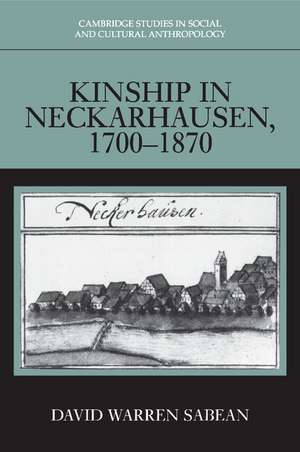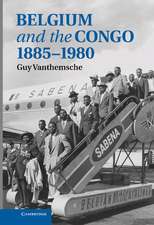Kinship in Neckarhausen, 1700–1870
Autor David Warren Sabeanen Limba Engleză Paperback – 12 dec 1997
| Toate formatele și edițiile | Preț | Express |
|---|---|---|
| Paperback (1) | 436.89 lei 6-8 săpt. | |
| Cambridge University Press – 12 dec 1997 | 436.89 lei 6-8 săpt. | |
| Hardback (1) | 957.05 lei 6-8 săpt. | |
| Cambridge University Press – 12 ian 1998 | 957.05 lei 6-8 săpt. |
Preț: 436.89 lei
Nou
Puncte Express: 655
Preț estimativ în valută:
83.60€ • 86.38$ • 69.55£
83.60€ • 86.38$ • 69.55£
Carte tipărită la comandă
Livrare economică 19 martie-02 aprilie
Preluare comenzi: 021 569.72.76
Specificații
ISBN-13: 9780521586573
ISBN-10: 0521586577
Pagini: 658
Ilustrații: 131 b/w illus. 159 tables
Dimensiuni: 152 x 229 x 34 mm
Greutate: 0.86 kg
Editura: Cambridge University Press
Colecția Cambridge University Press
Locul publicării:New York, United States
ISBN-10: 0521586577
Pagini: 658
Ilustrații: 131 b/w illus. 159 tables
Dimensiuni: 152 x 229 x 34 mm
Greutate: 0.86 kg
Editura: Cambridge University Press
Colecția Cambridge University Press
Locul publicării:New York, United States
Cuprins
Introduction: 1. An introduction to kinship; 2. Vetterleswirtschaft: rise and fall of a political discourse; 3. The politics of incest and the ecology of alliance formation; Cohort I (1700–9): 4. Introduction to kinship during the early decades of the eighteenth century; 5. Kinship as a factor in marriage strategy; 6. Marriage and kinship practices; 7. Ritual kinship; 8. Naming children; Cohort II (1740–9): 9. Restructuring the system of alliance; 10. Village politics at mid-century; Cohort III (1780–9): 11. Consanguinity as a principle of alliance; 12. The formation of an alliance system; 13. Ritual kinship and alternative alliance; 14. Naming an patrilineal alliance; Cohort IV (1820–9): 15. Kinship at the beginning of the nineteenth century; 16. Kinship and practice at the turn of the century; Cohort V (1860–9): 17. Kinship in the mid-nineteenth century village: an introduction; 18. Networking with kin around the mid-nineteenth century; 19. Matrifocal alliance; Conclusion: 20. Consanguinity in European perspective; 21. Neckarhausen in European comparative perspective; 22. Kinship and class formation; 23. Kinship and gender.
Recenzii
"...a superb piece of scholarship, which speaks to the interests of specialists working in different disciplines with different geographical concentrations." Karl Wegert, Canadian Journal of History
"This volume is without doubt the most theoretically well-informed, methodologically most sophisticated, and archivally best researched work in English on the History of community-level kinship in the European past." Anjrejs Plakans, Journal of Interdisciplinary History
"Powerful and thought-provoking, Sabean's work has once again clarified our 'thinking about past social processes.'" Journal of Social History
"This volume is without doubt the most theoretically well-informed, methodologically most sophisticated, and archivally best researched work in English on the History of community-level kinship in the European past." Anjrejs Plakans, Journal of Interdisciplinary History
"Powerful and thought-provoking, Sabean's work has once again clarified our 'thinking about past social processes.'" Journal of Social History
Descriere
Studying one German village in depth, Sabean questions the idea that the more modern society became, the less kin mattered.















